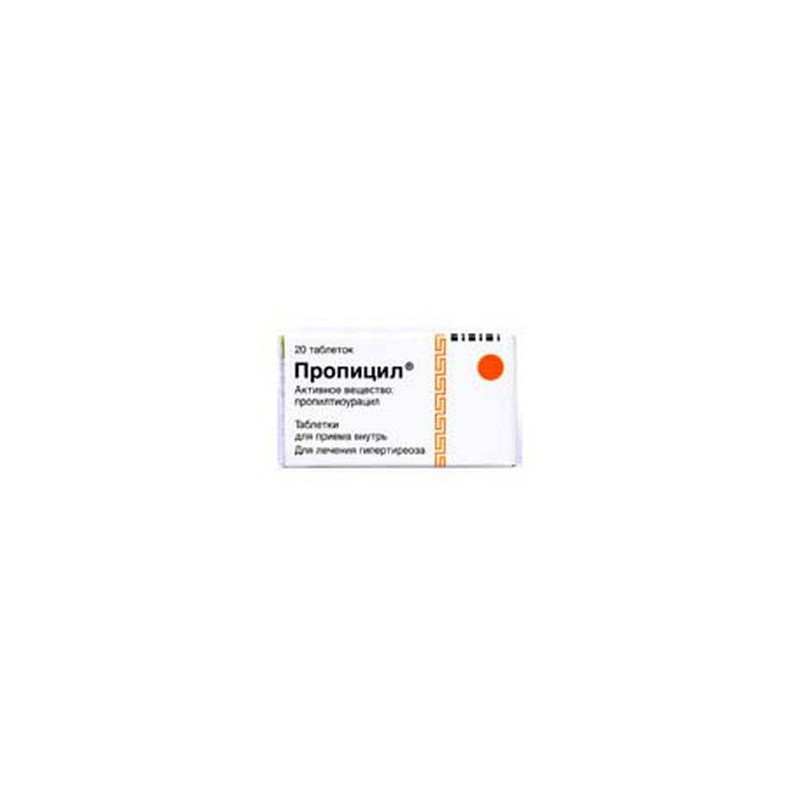



 All payments are encrypted via SSL
All payments are encrypted via SSL
 Full Refund if you haven't received your order
Full Refund if you haven't received your order
Pills
20 pieces
Propicil - antithyroid drug. The mechanism of action is associated with inhibition of the peroxidase system in the thyroid gland. Interfering with the process of iodination of thyroglobulin, the drug suppresses the formation of thyroxin. In addition, in the molecules of thyroglobulin, the formation of paired bonds between tyrosyl residues already linked to Iodine is disrupted.
Propylthiouracil contributes to the depletion of iodine in the thyroid gland. Under the influence of propylthiouracil, the conversion of thyroxin to triiodothyronine in peripheral tissues is also reduced.
- treatment of thyrotoxicosis with diffuse toxic goiter or toxic thyroid adenoma;
- preparation for resection of the thyroid gland or for the treatment of thyrotoxicosis with radioactive iodine.
- hypothyroidism;
- leukopenia, agranulocytosis;
- active hepatitis, liver cirrhosis, abnormal liver function;
- hypersensitivity to the drug;
- indications of a history of severe adverse reactions when using propylthiouracil (including agranulocytosis, severe damage to the liver).
Both thyrotoxicosis and hypothyroidism in pregnant women are associated with an increase in the frequency of miscarriages, stillbirth and developmental abnormalities.The frequency of developmental abnormalities in cases of treatment with propylthiouracil does not differ from the frequency of spontaneous developmental abnormalities.
In pregnancy, Propitsilom treatment should be carried out under the strict supervision of a physician. The level of thyroid hormones should be at the upper limit of the norm, the level of thyrotropin should be below the norm. Propicil should be prescribed in the minimum effective dose to avoid miscarriage, as well as the development of hypothyroidism and goiter in the fetus. In the third trimester of pregnancy, a spontaneous decrease in the severity of thyrotoxicosis is often observed. In case of diffuse toxic goiter in pregnant women, Propicil is prescribed only as monotherapy.
During lactation, propylthiouracil is considered the drug of choice, since its concentration in breast milk is only 1/10 of the level in the serum of the mother. However, special observation of the newborn is required, since there are reports of individual cases of hypothyroidism in a child.
At the beginning of treatment in adults and children over 10 years old, the drug is prescribed in a dose of 75-100 mg / day (1.5-2 pills / day). In severe cases and after a previous load of iodine, the initial dose is increased to 300-600 mg / day (6-12 pills / day) in 4-6 doses.
Maintenance dose is 25-150 mg / day (0.5-3 tab. / Day).
Children between 6 and 10 years old are prescribed at the beginning of treatment 50-150 mg / day (1-3 tab. / Day), and with maintenance treatment - 25-50 mg / day (0.5-1 pill / day).
The interval between doses of the drug during the day is usually 6-8 hours. pills should be swallowed whole, without chewing them and drinking plenty of liquid.
With thyrotoxicosis in newborns, the drug is prescribed in a dose of 5-10 mg / kg / day in 3 doses. In the absence of a therapeutic effect, it is recommended to increase the dose by 50-100%. Maintenance dose is 3-4 mg / kg / day.
The duration of treatment is determined individually.
Allergic reactions: sometimes - skin rash, urticaria; very rarely and mainly when using the drug in high doses - drug fever, lymphadenopathy.
Gastrointestinal: sometimes - pain in the stomach; very rarely and mainly when using the drug in high doses - liver damage (hepatocyte necrosis, transient cholestasis); in some cases - a violation of taste sensitivity, nausea, vomiting.
Hemic and lymphatic: rarely - agranulocytosis, accompanied by septic complications; very rarely and mainly when using the drug in high doses - thrombocytopenia; in some cases - violations of erythropoiesis, hemolysis.
On the part of the endocrine system: possible enlargement of the thyroid gland; rarely - the formation of goiter in the newborn.
Nervous system: in some cases - dizziness, neuromuscular disorders.
Other: sometimes arthralgia without signs of inflammation of the joints; in some cases, polyarthritis, vasculitis, lupus-like syndrome, periarteritis nodosa, Coombs positive reaction, interstitial pneumonia, peripheral edema, alopecia.
The thyreostatic effect of propylthiouracil may decrease with the simultaneous or previous use of iodine-containing drugs or radiopaque substances.
Due to the ability of propylthiouracil to affect the effect of free active fractions of propranolol and coumarin derivatives, additional dosage adjustment of these drugs may be required.
Symptoms: in chronic overdose, there is an increase in the thyroid gland and the development of hypothyroidism with symptoms that appear depending on the severity of hypothyroidism due to the specific action of the antithyroid agent.
Treatment: drug withdrawal. The effectiveness of gastric lavage and endoscopic removal of residual pills is highly questionable due to the rapid absorption of the active substance. Thyroxine replacement therapy is performed if this is justified by the severity of hypothyroidism. As a rule, after discontinuation of propylthiouracil, a spontaneous recovery of thyroid function can be expected.
The drug should be stored in a dry place at room temperature.
Propitsil